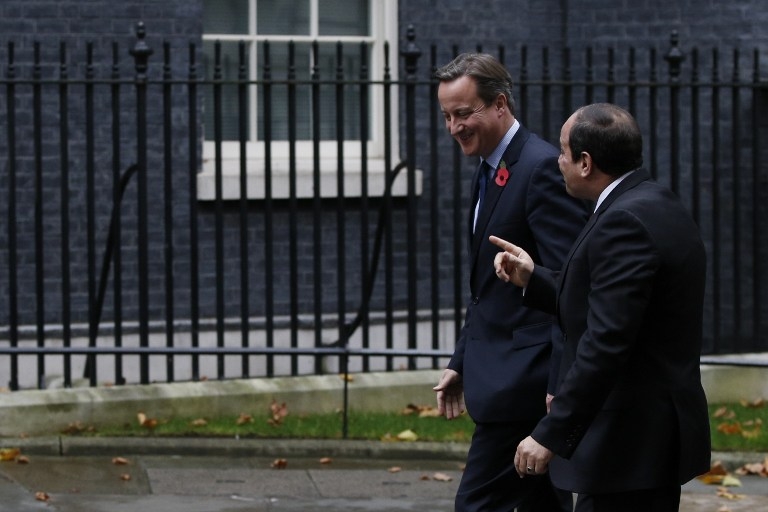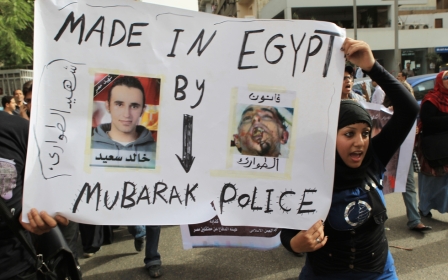EXCLUSIVE: UK took weeks to act on Cairo student killing concerns

The British foreign secretary expressed serious concerns about allegations of Egyptian security service involvement in the killing of a Cambridge University student in Cairo weeks before the UK government called for a "full and transparent" investigation into the case, Middle East Eye can reveal.
In a 24 March letter obtained exclusively by MEE, Foreign Secretary Philip Hammond wrote to Prime Minister David Cameron warning that reports that Egyptian security forces were involved in the death of Giulio Regeni would be an "extremely concerning development" if proved correct.
Regeni’s battered body was found in a ditch nine days after he had gone missing on 25 January, the anniversary of the Tahrir Square revolution.
The 28-year-old was in Egypt researching labour movements – a contentious subject in the country – as part of his doctoral studies at Cambridge.
The government led by President Abdel Fattah al-Sisi has faced accusations that its security forces were responsible for Regeni’s torture and death. It has repeatedly denied the allegations.
Relations between Italy and Egypt have soured in recent days over the investigation. Officials from Cairo refused to hand over what Rome saw as vital evidence, including mobile phone records and CCTV footage from the night Regeni went missing.
On Friday, Italy recalled its ambassador to Egypt for consultations in protest of the lack of progress in the probe.
Two weeks earlier in his letter to the prime minister whom he addresses as “David,” Hammond writes, “My officials have followed the case of Mr Regeni closely since his disappearance.
“The UK is aware of reports of the Egyptian security forces’ involvement in Mr Regeni’s death. If substantiated, this would be an extremely concerning development,” the foreign secretary added.
After remaining publicly silent on the issue for two months, the Foreign Office on Monday night called for the investigation into Regeni’s death in response to a parliamentary petition set up by the former student’s friends, which gained 10,000 signatories.
“We are very concerned by reports that Mr Regeni had been subjected to torture,” an FCO spokesperson said.
On Tuesday during Commons FCO questions, Crispin Blunt, chairman of the Foreign Affairs Select Committee, said in light of the EU referendum, "What lessons are our Italian partners going to draw from our lack of absolutely solidarity with the Italians over the case of Giulio Regeni?"
Last month, the committee released a report which found that Foreign Office ministers have created a perception that their human rights work is no longer a priority, particularly in Saudi Arabia and Egypt, and noted that "overall, the UK has not been supporting the Italian authorities as forcefully as his murder deserved".
'Quiet diplomacy'
Hammond’s letter suggests concern at high levels of British government weeks before the Foreign Office's public statement, drawing criticism from Regeni’s friends and former colleagues who now accuse the government of staying quiet over his death.
Jess Goyder told MEE that Regeni, her friend who lived in the UK for a decade, was “woven into the fabric of our family” during his time in the country.
Although she said the foreign secretary’s letter made it clear there was “quiet diplomacy” taking place, she described the fight to highlight Regeni’s case.
“We had to fight to put Giulio and human rights even on the agenda when a delegation of MPs visited Cairo shortly after his death,” she said.
“Our ambassador John Casson is very public about the UK being a ‘number one’ investor in Egypt. In failing to speak openly about Giulio’s case and the human rights situation, I am gravely concerned about the message we are sending out to the world about what it is we truly value.”
She added that her friend “loved Egypt and spoke excellent Arabic. His brilliance was very humane”.
Cameron's letter
In his letter, the foreign secretary also made clear the government’s knowledge of reports of brutal tactics employed by Egyptian security forces.
He voiced concern about “enforced disappearances” and “torture and mistreatment” of prisoners. “We continue to raise these issues with the Egyptian authorities,” he wrote.
Hammond’s remarks came in response to a letter that the prime minister sent to the Goyder family, former friends of Regeni who live in Cameron’s Witney constituency.
The foreign secretary's intervention may be seen as a way of allowing John Casson, Britain’s ambassador to Egypt, to distance himself from the case to avoid souring relations with the North African country.
Cameron’s original letter to the Goyders, also seen by MEE, said he had written to Casson, "asking what actions he is taking”.
Casson, a former Cambridge student himself, has made few public remarks over the death.
The "UK and Egypt" page on the Foreign Office website currently boasts news articles about "driving forward UK-Egypt business" and does not mention Regeni's case.
Anne Alexander, a Cambridge researcher on the Middle East, said: “It should not take 10,000 signatures on a petition to make the government speak out and add its voice to those who are calling for an independent investigation into [Giulio’s] brutal murder."
A Number 10 spokesperson said it was normal for the foreign secretary to respond on behalf of ambassadors. The government also stressed that David Cameron had written to the Goyder family and the foreign secretary in his role as an MP and not as prime minister.
Middle East Eye did not receive a response to repeated requests for comment from the British Embassy in Cairo.
Egyptian authorities have provided multiple versions of events as to what happened to the Cambridge student, which have been widely dismissed.
General Khaled Shalaby, who was placed in charge of the investigation despite holding a previous conviction for torture, initially claimed he had been killed in a traffic accident.
Authorities later blamed his death on a gang targeting foreigners.
Middle East Eye propose une couverture et une analyse indépendantes et incomparables du Moyen-Orient, de l’Afrique du Nord et d’autres régions du monde. Pour en savoir plus sur la reprise de ce contenu et les frais qui s’appliquent, veuillez remplir ce formulaire [en anglais]. Pour en savoir plus sur MEE, cliquez ici [en anglais].






